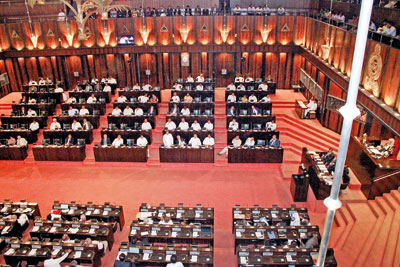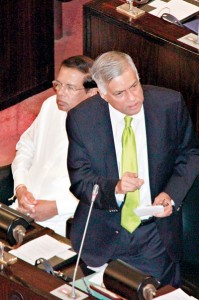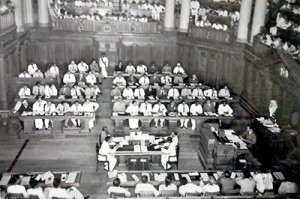News
Large absenteeism, JVP’s ‘House truths’ ring loud at ceremony
It was a solemn occasion when Parliament met on Tuesday to commemorate the 70th anniversary of its 1st sitting as an independent Legislature, but the absence of a large number of MPs dampened the atmosphere.

The oldest Parliament in Asia marked 70 years
Prime Minister Ranil Wickremesinghe moved the Motion commemorating the 70th anniversary, in which it was noted that the Parliament of Sri Lanka is the oldest Parliament in the Asia region, elected by universal adult franchise, with an unbroken record of democratic governance.” Leader of the Opposition R. Sampanthan seconded the Motion.
President Maithripala Sirisena, first to speak on the occasion, said the powers of Parliament have been strengthened since the present Govt came to power, with the reduction in the powers vested with the Executive.
“During the past 70 years we have had many new experiences. The lessons learnt from them will help ensure that the rights of the people and democracy in the country are safeguarded. It is the duty of all to strengthen democracy and law and order in the country,” the said.
On hand to witness the historic occasion were the Speakers of the Parliament of the South Asian Association of Regional Cooperation (SAARC) countries, who were in the country to participate in the 8th Conference of the Association of SAARC Speakers and Parliamentarians.
The President said their presence was a great honour to Sri Lanka.
“Today we are celebrating the 70th anniversary of this assembly. We have not only safeguarded Parliamentary democracy by shifting power back to the Legislature, but also ended an era which limited the rights of the people and weakened Parliament,” he said.

Prime Minister Ranil Wickremesinghe moved the Motion commemorating the 70th anniversary. Pix by Indika Handuwala
Leader of the Opposition and Tamil National Alliance (TNA) MP R. Sampanthan in his speech recalled the first meeting of Sri Lanka’s independent Parliament, which was on Oct.14, 1947, at Independence Square in Colombo, when the Duke of Gloucester, acting on behalf of the King and the Govt of the United Kingdom, the last of the Colonial Rulers, granted Sri Lanka, then known as Ceylon, her independence.
“I recall as a boy, being present at Independence Square when Sri Lanka was granted her independence and watching the event with great pride. Our first Prime Minister Hon D.S. Senanayake received that instrument of independence on behalf of the People of Sri Lanka,” he said.
The TNA Leader said the country has preserved democratic governance through electoral processes, though one must admit, not completely without blemish. “The truth must be acknowledged that the electoral process alone cannot ensure democratic governance. Electoral processes by themselves quite often serve to retain majoritarian. Recognition and respect for pluralism are fundamental to the achievement of genuine democracy,” he added.
Chief Opposition Whip and JVP MP Anura Kumara Dissanayake was cynical about the claims that Parliamentary democracy had served the country well. “If the walls of this Chamber could speak, it will be clear to all that, this so called “Temple of Democracy” has been manipulated to serve the interests of those in power. The reputation of Parliament itself has been sullied due to these actions,” he said.
Other party leaders too spoke on the occasion, while Speaker Karu Jayasuriya delivered the Vote of Thanks.
| The history of our Parliament | |
The first Parliament in Sri Lanka, known as the “House of Representatives”, met for the first time on Oct.14, 1947, at the State Council building (Old Parliament Building) in Colombo. It comprised 101 Members, of which 95 were elected by universal suffrage and 6 nominated by the Governor General.  Sri Lanka's first parliament met on Oct.14, 1947. Pic courtesy Parliament.lk The General Election was held for 19 days between Aug.23 and Sept.20, 1947. The United National Party won 42 seats to secure a majority, and D.S. Senanayake was sworn in as the country’s first Prime Minister. The other political parties that won seats at the General Election were the Lanka Sama Samaja Party, Bolshevik Leninist Party, Communist Party, Labour Party, All Ceylon Tamil Congress and the Ceylon Indian Congress. Twenty Independent candidates were elected as well. Sir Francis Molamure, 1st Member for Balangoda, was elected as Speaker and L.P. Deraniyagala, C.B.E was the Clerk to the House of Representatives. The 1st Parliament of Sri Lanka (then Ceylon) was bicameral with two chambers known as the Senate and the House of Representatives. It was established as per the proposals put forward by the Soulbury Commission and by way of a Ceylon (Constitution) Order in Council. This replaced the State Council of Ceylon established in 1931. The Senate was abolished in 1971 and the House of Representatives was replaced with the unicameral National State Assembly in 1972, when the 1st Republican Constitution was enacted. With the promulgation of the 2nd Republican Constitution on Sept.7, 1978, the 1st Parliament of the Democratic Socialist Republic of Sri Lanka superseded the 2nd National State Assembly. The current Parliament is the 8th Parliament of the Democratic Socialist Republic of Sri Lanka, and 17th overall. Since 1947, 14 MPs have held the office of Prime Minister, while there have been 18 Speakers of Parliament. There have been seven Secretaries-General of Parliament (previously known as Clerk to the House), to date. |

